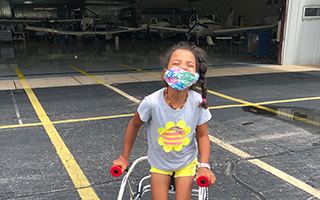
Feb. 3, 2021
St. Louis, MO-based Wings of Hope – an aviation humanitarian group, in which business aviation pilots play a key role – has been among many organizations central to critical transport during the COVID-19 pandemic. That said, there’s more to the story, and it starts here:
After a devastating drought hit northwest Kenya in 1959, missionaries determined that aviation could be the answer to saving lives. Jerry Fay, a Pacific Northern Airlines pilot, and Bishop Joseph Houlihan established the Marian Medical Airplane Fund to raise $11,000, they bought a new 1959 Piper Super Cub 18A and shipped the plane from Lock Haven, PA, to Addis Ababa, Ethiopia in 1963.
And with that, the foundation for what is now Wings of Hope (WOH) was set.
Today, Wings of Hope is a nonprofit organization that operates around the world, providing medical air transport services, free of charge, to patients who need specialized medical care that is not available to them locally. In the United States, their U.S. Medical Relief & Air Transport Program operates in 30 states within a 900-mile radius of the WOH St. Louis, MO headquarters. The U.S. program served 219 patients in 2019, with 16 volunteer pilots flying 116,754 nautical miles in three business aviation aircraft owned by WHO – a Piper Navajo, and two Piper Senecas.
It takes a certain kind of special pilot to serve as a WOH volunteer, said Angela Walleman, director of medical relief and air transport program and human resources for WOH.
“All pilots must hold at least a commercial pilot’s certificate and an instrument rating with a minimum of 1,000 total hours flight time, including 200 hours multi-engine piston time,” said Walleman. “They must be deemed by the chief pilot to be compatible with other crew members, and understand the atmosphere of safety-first within the organization. The goal in accepting pilots is that they are not out to build flying time, but are truly interested in helping others with their skillset.”
Walleman added that since many of the program’s patients are immunocompromised, WOH requires ground crew and medics to wear masks at all times, as well as pilots when not flying the airplane. Each aircraft undergoes UV light sterilization after every flight, and patients must prove a negative COVID test five days or less before the flight.
Wings of Hope is 100% funded by donations from individuals, corporations and foundations.
“We count on the generosity of our donors,” said Carol Enright, WOH communications manager.
“We also welcome NBAA members who want to get involved with us as volunteers,” WOH president and CEO Bret Heinrich added. “We have places for volunteer pilots, mechanics, purchasers, accountants and more.”
